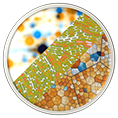
Microbial Physiology and Molecular Biology
Antimicrobial-resistant (AMR) pathogens are among the greatest global health threats, as some bacteria are already resistant to all currently available antibiotics. Our research focuses on the spread of AMR pathogens and resistance genes in the environment, such as wastewater and soil. In addition to identifying and characterizing novel antimicrobial substances, we are seeking alternative ways to contain AMR pathogens, for example, through the use of bacteriophages.
A particular research focus is on the anaerobic and human pathogen Clostridioides difficile, a common cause of nosocomial infections characterized by a high relapse rate. Through its ability to form highly resistant endospores, the bacterium withstands the harsh conditions in the intestine. How the vegetative and toxin-producing cells adapt to the diverse stress factors in the intestine has so far been little researched. Among other things, we are investigating how this strictly anaerobic pathogen defends itself against low concentrations of oxygen and the reactive oxygen species produced by the immune system. Using proteomics and redox proteomics, we analyze oxidative sensor proteins, protective mechanisms, and protein oxidation to uncover potential targets for new therapies.
Another focus is on the bacterium's cell membrane, whose structure and function are influenced by antimicrobial substances and the high concentrations of bile acids in the intestine. Membrane-active substances could be used in combination with antibiotics in the future to treat C. difficile infections even more effectively. In addition to researching individual infectious agents, our research group studies complex microbial communities. Microbes colonize almost all habitats on Earth and form specific microbiomes whose precise functions are often still unknown. Using mass spectrometry-based proteomics and metaproteomics, we aim to elucidate the activities, interactions, and significance of microbiomes. For example, we are researching the microbiome of agricultural soils to identify beneficial microbes for plant health, determine harmful microbial influences, and uncover connections to different agricultural practices. Another focus is on the microbiome of municipal wastewater. We are particularly interested in the transmission of pathogenic and antibiotic-resistant bacteria and their genes during wastewater treatment and their entry into natural surface waters.
In summary, our research aims to develop innovative approaches to combat antibiotic-resistant bacteria and to better understand the importance of microbiomes for human, animal, and environmental health.
Contact
PD Dr. rer. nat. Susanne Sievers
Tel.: 03834 420 5900
Sekretariat
Helga Korthase
Institute of Microbiology
Microbial Physiology and Molecular Biology
Tel.: 03834 420 5901
Fax: 03834 420 5909
